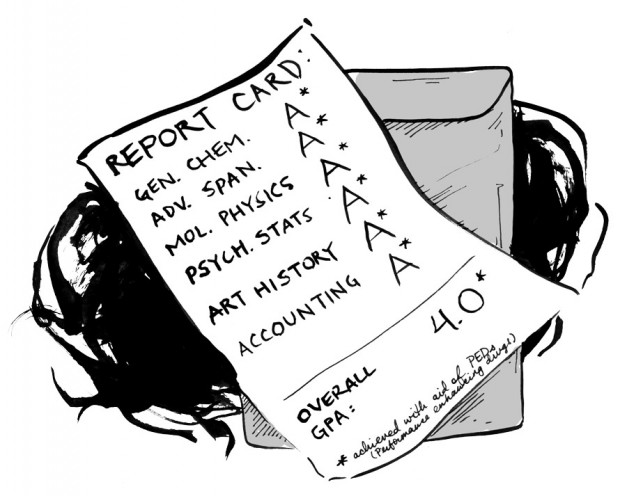Staff Columnists
Study Drugs, friend or foe?
Recently, Student Life ran an article about the use of so-called “study drugs,” such as Adderall which, through their usage, allow students to operate at a level beyond their normal peak efficiency and study for long hours into the night. Who wouldn’t want such a drug, you might ask? The answer should be simple and obvious: nobody.
In a school such as ours, the benefits are clear; you have the painless opportunity to get better grades, give yourself more time and feel more comfortable in the school environment. The downsides are less evident, extremes of a problem not easily seen in the Wash. U. bubble.
Drug addiction is something that is scarcely talked about at Wash. U. Marijuana is hardly an issue in that regard, and anyone who regularly takes crack or heroin wouldn’t have made it here in the first place. So when a substance that is beneficial is put in front us, we have a tendency to ignore the risks and amplify the rewards.
There is a reason that drugs for ADHD are classified as Schedule II narcotics by the FDA, and it’s not because some oppressive moralistic government wants to stop people from getting high. It is because there is significant potential for abuse.
And as any person who has taken a regimen of pain medication after a major surgery will tell you, stopping can be incredibly difficult, because it feels freakin’ awesome. This is no different for Adderall; it doesn’t just make you concentrate, it makes you euphoric, and you go through withdrawal when you don’t get it.
Medications for pain are prescribed and strictly controlled, as is Adderall. People with legitimate disorders, such as ADHD, need to take it, and until the American Medical Association calls “being overworked” a disorder, a healthy person does not.
But taking a performance-enhancing drug is more than just dangerous (I’m not trying to be your parents); it is immoral and inconsistent with the message that students attending an elite university should convey.
Yes, I understand that many of us are incredibly overworked, but I’ll stake my life on the claim that we expected it to be that way when we matriculated.
“Study drugs” don’t just compromise your body, and they don’t just compromise the grade distribution (which in a class that is curved can actually harm other students); they compromise our academic honesty.
Every one of us got here on our own ability. We come from families rich and poor and attended high schools in the wealthiest counties and the most dangerous ghettos. The one thing that every one of us here shares is that we have all reached a certain level of accomplishment just to attend.
When you take a drug to extend yourself beyond your own normal abilities, you are disrespecting everything that has come before and the hard work that you have done over the years, because they are performance enhancers. It is not endurance you were born with, it is endurance given to you artificially.
This is just a symptom of a larger problem; people go for the easy win, the quick fix. Just as people try to lose weight by taking pills when it takes month after awful month of exercise and dieting, we want the fast, easy way to get work done. For us, that means taking a pill.
You could very easily be trying to accomplish too much. Why do we need a double major? Why do we need to be part of all those clubs? The answer is, we don’t. They might be important to us, but in the end, the only important thing is that the work we do is all our own.
If you can’t keep up in the class, get help and work harder. If it is too much, reduce your commitments. Plenty of people are just as far behind, but they use their own drive to keep going.
When I graduate, I don’t want to credit my accomplishment to any substance, any pill. I want to be able to walk up on that stage and know that what got me there was not my doctor’s prescription pad, or my friend who deals Adderall. I want to know—not believe, but know—that the diploma in my hand is mine.

